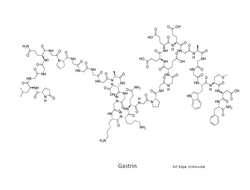Hormones, nutrient digestion, absorption, and metabolism
Published: April 29, 2022
Several hormones are necessary for effective nutrient digestion, absorption, and metabolism of the foods and beverages you consume.
An array of enzymes and your parasympathetic nervous system also participate in nutrient metabolism.
Hormones are chemical messengers which respond to stimuli and mediate in a wide variety of metabolic reactions in your body.
In general, hormones are produced and released by endocrine glands.
Hormones are transported in your blood to their specific target sights, such as various tissues and organs, which respond to hormonal stimuli.
The over arching function of hormones is to maintain homeostasis within your body. The production and release of hormones occurs in response to your body's changing conditions.
Enterogastrones is the general term for hormones associated with your gastrointestinal tract.
Once food is digested and nutrients have been absorbed other hormones respond to the changing nutrient environment within your blood.
This influences a variety of metabolic reactions and the utilization of absorbed nutrients.
Whereas all enzymes are proteins, only some hormones are proteins. Other hormones such as reproductive hormones testosterone and estrogen are cholesterol based.
Hormones switch metabolic reactions on or off, while enzymes facilitate the making and breaking of chemical bonds of compounds within your body.
Innervation of hormonal response in your gastrointestinal tract
Innervation of hormonal response in your gastrointestinal tract (GI) is initiated through your sensory perception of food.
When you see, think about, smell, and taste food, and even when you hear the sound of food cooking your hormonal system responds.
Your parasympathetic nervous system also responds and begins to prepare your body for digestion of food that you may soon consume.
Over time your body becomes accustomed to the types of nutrients you most frequently consume which improves sense recognition and hormonal response.
If you make radical changes to your diet, over a short period of time, your hormonal response takes time to adjust to the different stimuli.
Initially your body may not produce an adequate supply of specific hormones and innervation of sufficient amounts of nutrient specific enzymes may be delayed.
This may be one reason why drastic changes in diet can result in disrupted...link to the full article to learn more
References
1.
Whitney, E. & Rady Rolfes, S. (2005). Understanding Nutrition. Belmont, CA: Thomson Wadsworth
2.
Gropper, S.S., Smith, J.L. & Groff, J.L. (2005). Advanced Nutrition and Human Metabolism (4thEd.). Belmont, CA: Thomson Wadsworth.

